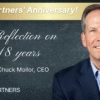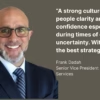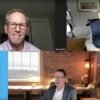
As a coach who regularly works with senior level business executives, I’m often asked the question “from your perspective, what does it take to become an inspirational leader”? But before I answer that question, I’d like to provide some perspective, or as we say in coaching, “take a measure of today’s current reality” around two critical market changes taking place simultaneously.
First, it’s clear from the overwhelming amount of workforce research that has been conducted over the last 15 years by Gallup and others that fewer than 30% of all the employees surveyed describe themselves as actively engaged in their jobs. It’s estimated this contributes to a potential loss of productivity of over $500B annually in the United States alone.
Even more disconcerting is that much of employee workplace dissatisfaction stems from a lack of trust and belief in their management. In fact, how they view their managers accounts for as much as 70% of the variance in employee engagement results.
Another source, that supports this trend is found in the annual Edelman Trust Barometer which measures senior leadership in Government, Business, Media, and NGO’s, found that the credibility and trust of CEO’s has fallen 12% in the last year to an all-time low of 37%.
The study concludes that the findings of the Trust Barometer are “deeply disturbing”, in part because many leaders still take a hierarchical “command and control” approach to management at a time when employees long for authenticity, purpose, and inspiration. It’s obvious there are some significant hurdles to overcome in re-establishing trust in leadership, but the smart leader of the future will not let this “crisis in confidence” go to waste.
Second, the challenges that business leaders face today are significantly more complex and unpredictable than at any time in our history. Acceleration of innovation and the velocity of disruption brought on by advancements in technology are having a major impact and reshaping virtually every industry.
In fact, the acronym VUCA, (Volatile, Uncertain, Complex, Ambiguous) which was coined by the U.S. military at the end of the cold war, has been aptly co-opted by strategic business leaders to describe the chaotic, turbulent, and rapidly changing business environment that has become the “new normal”.
The challenges for leaders comes down to managing through unprecedented market forces while at the same time investing the time necessary to build trust and inspire the people under and around them.
Here is my short list of critical skills necessary to be an inspirational leader in the future.
Self-Awareness:
A foundational requirement that comes down to having an honest understanding of how people experience you, and how people experience themselves when they’re with you. It implies a willingness on the part of the leader to try new approaches to relationships both inside and outside the organization that inspire and motivate those around them. The previously mentioned Edelman report showed that 80% of employees wanted to better understand a CEO’s personal values, 73% wanted to know about obstacles the CEO has overcome, and 68% said they wanted to hear about a CEO’s success story. Openness and transparency begins with a realistic and honest level of self-awareness. We use an insightful assessment tool called the Predictive Index® (PI®) to increase self-awareness, it measures a person’s behaviors, strengths, and how they work with people and their responsibilities. It provides effective insights for self-understanding and how behavioral traits and drives contribute to one’s leadership style.
Intellectual Curiosity:
To excel as a leader in today’s intensely competitive environment, intellectual curiosity is critical. Being a lifelong learner is foundational to understanding and recognizing opportunities in your own field and capitalizing on best practices in other related fields and disciplines. The reality is that the world is changing faster than most leaders are learning. Not only do leaders need to learn faster and adapt more quickly, but their organizations need to adapt faster as well to be competitive in the “new normal” environment.
Resilience:
To lead successfully in the future, leaders will need to adopt a mindset that accepts change and uncertainty as an opportunity for growth. Ultimately change builds character over time, and enables the leader to see both opportunities and challenges from an honest and realistic perspective. Attitude is a little thing that makes a big difference, and leaders with a growth mindset motivate others around them and use optimism as a force multiplier.
Humility:
The higher you rise in an organization, the more people will look to you for answers. The best leaders don’t try to provide all the solutions, but instead inspire curiosity, creativity, and deeper thinking in their employees. Get comfortable saying less and asking more questions to encourage your employees to share their challenges. Make a habit of asking open ended questions like “how can I help” and “what truly matters in this situation” that force your employees to define the problem and encourages them to take ownership and responsibility.
A Culture of Engagement:
By creating a culture of engagement that ties your employees to the mission of the organization, you facilitate opportunities for employees to grow, develop new skills, and most importantly try new things. With their “Project Aristotle”, Google found that providing “psychological safety” in the form of encouragement from the highest levels of the organization to experiment with new ideas yielded tremendous results in terms of both new product development and employee satisfaction.
Last but not least, enlist support like hiring an executive coach. Get an external perspective to help guide you on your leadership journey. Leveraging support has been proven to dramatically increase leadership effectiveness.
For the past 10 years, MCG Partners has been helping leaders manage complex organizational changes more effectively and with greater confidence, inspire and empower higher levels of performance from others, and experience greater satisfaction both personally and professionally. We’d love to have a conversation about how we can help you reach your goals and succeed in the future.
About the Author: Riley McDonough
About MCG Partners
MCG Partners a woman-owned, Greater Boston-based consultancy specializing in executive coaching, leadership development, talent management, and organizational development solutions. We help businesses optimize success through the entire management life-cycle. MCG Partners is also a Predictive Index® (PI®) certified partner.
To learn more about MCG Partners’ services or The Predictive Index®, contact John Griffith at john.griffith@mcgpartners.com or visit mcgpartners.com.








